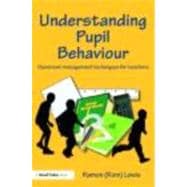This book describes a system of successful classroom behaviour management techniques developed by the author over more than twenty-five years. It outlines the difficulties confronting teachers trying to manage pupilsa (TM) misbehaviour in schools and describes four types of pupil who can be helped to behave responsibly.
In Understanding Pupil Behaviour Ramon Lewis explains how pupilsa (TM) behaviour can be categorised and how techniques can be introduced to deal with each category, however challenging








